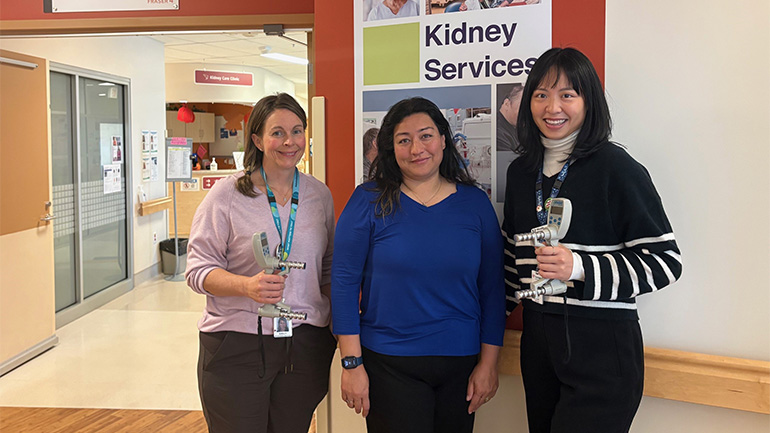
Part five of our Knowledge Translation Challenge series features a dietitian team committed to improving the health of people living with chronic kidney disease.
Photo (L-R): Shelly Messenger, dietitian practice lead; Laila Akbar, renal dietitian; Nicole Huang, renal dietitian.
When Laila Akbar whips out her dynamometer, people pay attention. “It’s a great conversation starter,” says the renal dietitian at Abbotsford Regional Hospital and Cancer Centre. “Patients and nurses are intrigued, and it’s quick to use.” Known affectionately as ‘the gun,’ the dynamometer is used by dietitians to measure patients’ handgrip strength.
Handgrip strength and another set of clinical tests—The Subjective Global Assessment—are helpful in assessing a patient’s nutrition status. People with chronic kidney disease often experience poor nutrition and muscle loss, which can affect their strength, recovery and overall health.
“We know that handgrip strength and other clinical assessments are important indicators of overall nutrition, says Laila, “but a national study confirms that they are not used consistently by dietitians, in part due lack of training and time constraints.”
Thanks to funding from Fraser Valley Health Care Foundation and Michael Smith Health Research BC, Laila and her KT team partners, Shelly Messenger, dietitian practice lead, Nicole Huang, renal dietitian and Rebekah Sandhu, research dietitian and educator, are embarking on a two-year project to empower dietitians to be more comfortable using clinical tools—like the dynamometer—to assess patients.
“We are aiming to identify and remove barriers and then create and deliver training, resources and supports to build skills and confidence,” adds Laila.
The resources will be integrated into daily practice and assessed for effectiveness.
The project will involve dietitians, educators, managers and patient partners. By making assessments more consistent and effective, the KT team hopes to improve care and support better health outcomes for people with chronic kidney disease.
Learn more about the KT Challenge.
Read other stories in our series:
